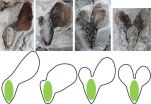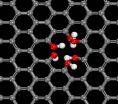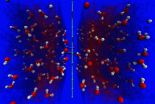How we became nature -- Anthropocene
Nobel Laureate, professor Paul Crutzen explains our present epoch in geological history
2015-03-17
(Press-News.org) Overpopulation, the greenhouse effect, warming temperatures and overall climate disruption are all well recognized as a major threat to the ecology and biodiversity of the Earth. The issue of mankind's negative impact on the environment, albeit hotly debated and continuously present in the public eye, still only leads to limited policy action.
Urgent action is required, insist Paul Cruzten and Stanislaw Waclawek, the authors of "Atmospheric Chemistry and Climate in the Anthropocene", published in open access in the new Chemistry-Didactics-Ecology-Metrology.
In their sobering review, Crutzen, the 1995 Nobel Laureate in Chemistry, and Waclawek, outline the development of a new geological epoch - the Anthropocene, where human actions become a global geophysical force, surpassing that of nature itself.
Anthropocene, which relates to the present geological epoch, in which human actions determine the behavior of the planet Earth to a greater degree than other natural processes. The term, coined by American ecologist Eugene F. Stoermer and popularized by Crutzen, introduced the epoch succeeding the Holocene, which is the official term for the present epoch on Geological Time Scale, covering the last 11, 500 years.
Although Anthropocene is not a new concept, it is only now that the authors present stunning evidence in support of their claim. The article describes the negative impact of the human footprint, which ensues a gradual destruction of the Earth. Highlighting different data elements - it yields overwhelming evidence that "man, the eroder" now transforms the atmospheric, geologic, hydrologic, biospheric, and other earth system processes.
The list is long and unforgiving:
Excessively rapid climate change, so that ecosystems cannot adapt
The Arctic ocean ice cover is thinner by approximately 40% compared to 20-40 years ago
Ice loss and the growing sea levels
Overpopulation (fourfold increase in the 20th century alone)
Increasing demand for freshwater
Releases of NO into the atmosphere, resulting in high surface ozone layers
Loss of agricultural soil through erosions
Loss of phosphorous. Dangerous depletion in agricultural regions
Melting supplies of phosphate reserves (leading to serious reduction in crop yield)
Describing the negative impact of human activities on the environment, the authors identify planetary boundaries, as means to attaining global sustainability. It is "a well-documented summary of all humankind actions affecting the environment on all scales. According to Crutzen, we live in a new era, Anthropocene, and our survival fully depends on us. I strongly recommend this unusual publication in the form of highly informative compressed slides and graphs." says Marina Frontasyeva from the Joint Institute for Nuclear Research in Dubna, Russia. Nature is us, and responding to the Anthropocene means building a culture that grows with the Earth's biological wealth instead of depleting it.
INFORMATION:
The original article is available fully open access to read, download and share on De Gruyter Online: http://www.degruyter.com/view/j/cdem.2014.19.issue-1-2/cdem-2014-0001/cdem-2014-0001.xml?format=INT
About the Authors:
Paul Crutzen is Dutch chemist and the 1995 Nobel Prize Laureate in Chemistry. In 1970, he demonstrated that chemical compounds of nitrogen oxide accelerate the destruction of stratospheric ozone. He heads the Atmospheric Chemistry Department at the Max Planck Institute for Chemistry in Berlin.
About the Journal:
Chemistry-Didactics-Ecology-Metrology is an open access interdisciplinary journal, covering chemistry, didactics, chemometry, metrology and environmental protection as well as in the related fields It publishes original research papers discussing chemical processes in bot metrology as well as monitoring and biomonitoring of environment.
ELSE PRESS RELEASES FROM THIS DATE:
2015-03-17
TORONTO, March 17, 2015 - A group of York University investigators and their international counterparts have jointly created a database of lake surface temperatures, to help study ecological effects of climate change.
"There has been a significant need to put together a database like this, considering the rapid warming of lakes," observes Professor Sapna Sharma in the Department of Biology in the Faculty of Science who led the international effort.
As part of the Global Lake Temperature Collaboration (GLTC) project, Sharma and several of her undergraduate students, Anam ...
2015-03-17
AUSTIN, Texas - People who recently have been infected with HIV may not be as highly infectious as previously believed, a finding that could improve global efforts to prevent HIV transmission and save lives. In particular, the finding bolsters the strategy of treating patients with antiretroviral drugs before the onset of AIDS to prevent transmission.
Mathematical epidemiologists Steve Bellan, a postdoctoral researcher at The University of Texas at Austin, and Lauren Ancel Meyers, a biology professor at the university, authored the paper with researchers from McMaster ...
2015-03-17
Scientists in a collaboration led by Dai Takei of the RIKEN SPring-8 Center in Japan have, for the first time, examined a detailed 'time lapse' X-ray image of the expansion of a classical nova explosion using the GK Persei nova -- a binary star system which underwent a nova explosion in 1901.
Through this work, they hope to gain a better understanding of the expansion of gases in the universe, including not only in classical novae but also in supernovae--tremendous stellar explosions that are believed to be responsible for the creation of heavy elements such as uranium ...
2015-03-17
Vitamin D may play a vital role in the prevention and treatment of diseases associated with aging, according to researchers at Loyola University Chicago Marcella Niehoff School of Nursing (MNSON). These findings were published in the latest issue of the Journal of Aging and Gerontology.
Researchers reviewed evidence that suggests an association between vitamin D deficiency and chronic diseases associated with aging such as cognitive decline, depression, osteoporosis, cardiovascular disease, high blood pressure, Type 2 diabetes and cancer.
"Vitamin D deficiency is a ...
2015-03-17
Hamilton, ON (March 17, 2015) - It's long been known that obese men are more likely to develop type two diabetes than obese women, but researchers at McMaster University have discovered it may be related to a difference between the sexes in the activity of a protein in the muscle.
As people become overweight, their skeletal muscle develops insulin resistance that can lead to type two diabetes. In a paper published by Scientific Reports today, the research team found the activity of this protein, called PTEN (for Phosphatase and tensin homolog deleted on chromosome 10), ...
2015-03-17
CORVALLIS, Ore. - Young, inexperienced drivers have always gotten into more automobile accidents, but if you add in a lot of distractions, it's a recipe for disaster - and a new Pacific Northwest research program is learning more about these risks while identifying approaches that may help reduce them.
Distractions have been an issue since the age of the Model T, whether a driver was eating a sandwich or talking to a passenger. But the advent of cell phones, text messaging and heavy urban traffic has taken those distractions to a historic level, say researchers, who ...
2015-03-17
The whirling, winged seeds of today's conifers are an engineering wonder and, as University of California, Berkeley, scientists show, a result of about 270 million years of evolution by trees experimenting with the best way to disperse their seeds.
The first conifer species that produced seeds that whirl when they fall used a variety of single- and double-winged designs. Whirling, or helicoptering, keeps a seed aloft longer, increasing the chance that a gust of wind will carry a seed to a clearing where it can sprout and grow unimpeded by competitors
"Winged seeds may ...
2015-03-17
The honeycomb structure of pristine graphene is beautiful, but Northwestern University scientists, together with collaborators from five other institutions, have discovered that if the graphene naturally has a few tiny holes in it, you have a proton-selective membrane that could lead to improved fuel cells.
A major challenge in fuel cell technology is efficiently separating protons from hydrogen. In a study of single-layer graphene and water, the Northwestern researchers found that slightly imperfect graphene shuttles protons -- and only protons -- from one side of the ...
2015-03-17
An atomically thin membrane with microscopically small holes may prove to be the basis for future hydrogen fuel cells, water filtering and desalination membranes, according to a group of 15 theorists and experimentalists, including three theoretical researchers from Penn State.
The team, led by Franz Geiger of Northwestern University, tested the possibility of using graphene, the robust single atomic layer carbon, as a separation membrane in water and found that naturally occurring defects, essentially a few missing carbon atoms, allowed hydrogen protons to cross the ...
2015-03-17
An analysis of genetic and lifestyle data from 10 large epidemiologic studies confirmed that regular use of aspirin or other non-steroidal anti-inflammatory drugs (NSAIDs) appears to reduce the risk of colorectal cancer in most individuals. The study being published in the March 17 issue of JAMA found that a few individuals with rare genetic variants do not share this benefit. The study authors note, however, that additional questions need to be answered before preventive treatment with these medications can be recommended for anyone.
"Previous studies, including randomized ...
LAST 30 PRESS RELEASES:
[Press-News.org] How we became nature -- Anthropocene
Nobel Laureate, professor Paul Crutzen explains our present epoch in geological history


